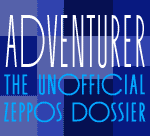|
When Kapitein Zeppos was launched on Belgian television in 1964, it
was the latest in a growing line of memorable children's television
productions produced by the BRT. The previous year had seen the
light-hearted time travel romp,
De tijdscapsule ("The Time
Capsule") which, in common with Kapitein Zeppos, was directed
by Senne Rouffaer and produced by Rik Van den Abbeele. But of all
Belgian children's television, it was 1964's entry which would
perhaps become the most fondly recalled.
Kapitein Zeppos told the story of a mysterious man, Jan
Stephorst, who has returned from his travels in Greece, Arabia,
Turkey and Crete. In Greece, he became
known as Captain Zeppos - the 'captain' because he owned a boat,
and 'Zeppos' because the locals couldn't pronounce 'Stephorst'. It
is under this moniker that Stephorst returns incognito to his
homeland of Belgium to claim his inheritance - the beautiful castle
and grounds of the Belderbos estate. His return is greeted with much
suspicion among the townsfolk of the nearby Belder, but he is at
least welcomed by young Ben Kurrel who quickly forms a strong bond
of friendship with the stranger. As the story progresses, it becomes
apparent that there is more to the Belderbos estate than either
Zeppos or the people of Belder ever realised.
The introductory Kapitein Zeppos serial was written by Lode de Groof
(also known as Louis) - who contributed many scripts for the Belgian youth series over the
years - and featured Senne Rouffaer as the eponymous Captain.
Rouffaer had been engaged to direct the serial and was not
originally cast as Zeppos - Ward de Ravet, who would ultimately play
the Captain's nemesis, Baral, later in the serial, was the original
choice to play Zeppos. Due to illness just prior to the start of
filming, de Ravet had to be quickly replaced - and consequently, it
was Senne Rouffaer who ended up playing one of the most celebrated
roles in Belgian children's television, while de Ravet was left to
recover from his illness, joining the production further down the
line as Baral. It's fascinating to consider how the series would
have turned out with de Ravet in the role - he and Senne Rouffaer
were very different types, in terms of appearance, age and build. No
doubt about it, Ward de Ravet's Kapitein Zeppos would have been a
very different animal.
The series was transmitted to enthusiastic
audiences, making its mark over its sixteen week transmission -
enough to generate a tie-in novel and two sequels four years later.
The success of Kapitein Zeppos was not, however, restricted
to Belgium. The original Flemish version went on to be broadcast in
the Netherlands, Sweden and Finland and the BBC in the United
Kingdom also saw the potential of the series and acquired it for
broadcast there too. As was the common BBC practice at that time, a
new soundtrack was recorded in English, and the episodes edited to
fit the timeslots. This BBC version was then distributed to
English-speaking nations, and, as Captain Zeppos, the series
aired in countries such as Australia, Canada, Ireland, Jamaica and
New Zealand. The English language prints also made it (subtitled, we
assume) to Egypt, Hong Kong, Japan and Nigeria. Unfortunately, only
the first series was ever dubbed into English. You can read more
about the
English version elsewhere on our site.
This first 16 episode Kapitein Zeppos
serial cost 5 million Belgian francs to make, which was a
considerably smaller budget to work to than that for similar
programmes from other countries. Regardless of the skimping that had
to take place, Belderbos rarely looks anything other than
expensive - the locations are beautiful, the camerawork and
direction first rate. It is very easy to see why Belgian children
and their families became hooked upon it and fell in love with the
series.
Unlike the other Kapitein Zeppos
serials, the first has individual episode titles for each week's
installment. These were illustrated with a series of striking
caption cards. These are included in our
episode guide.
All episodes exist today
on film in the VRT Archives and have been released on
home video
in Belgium. This serial was repeated on Belgian television in 1979,
1985 and most recently between Sunday 5th October 2003 and Sunday 11th January 2004.
|
